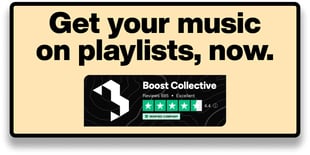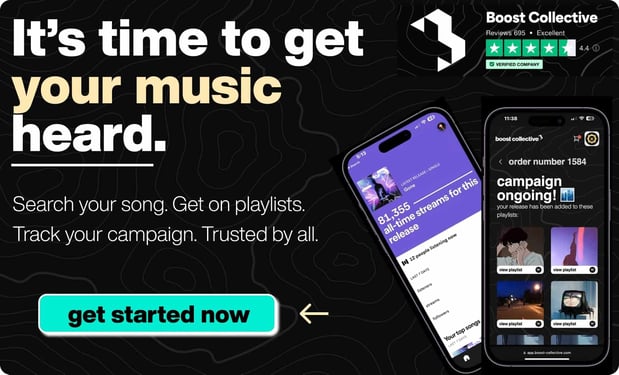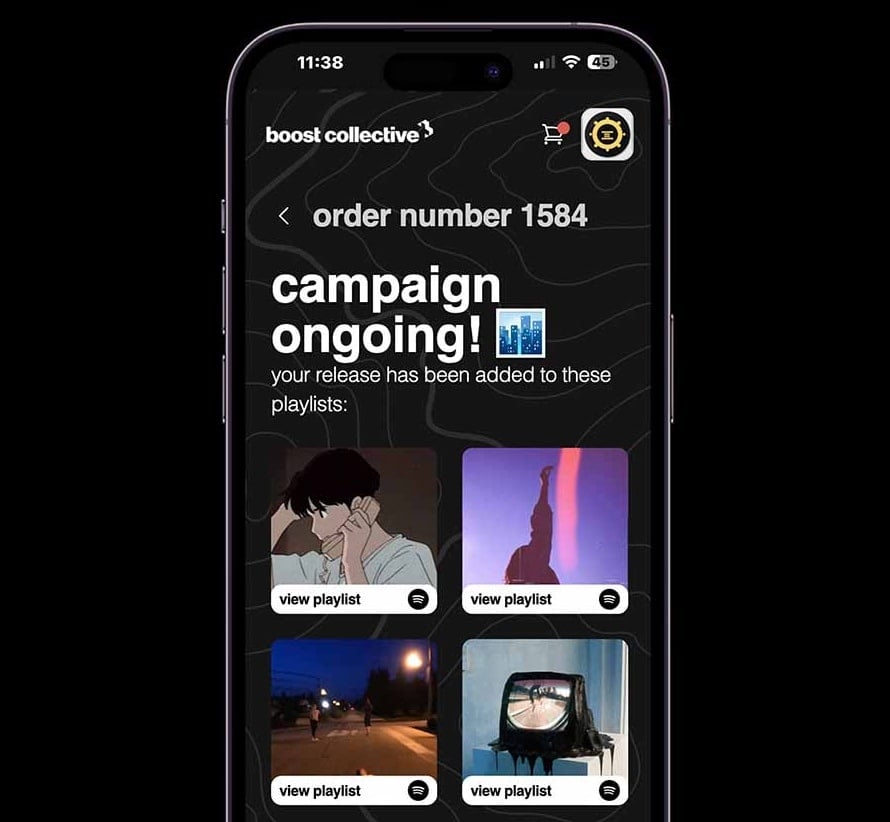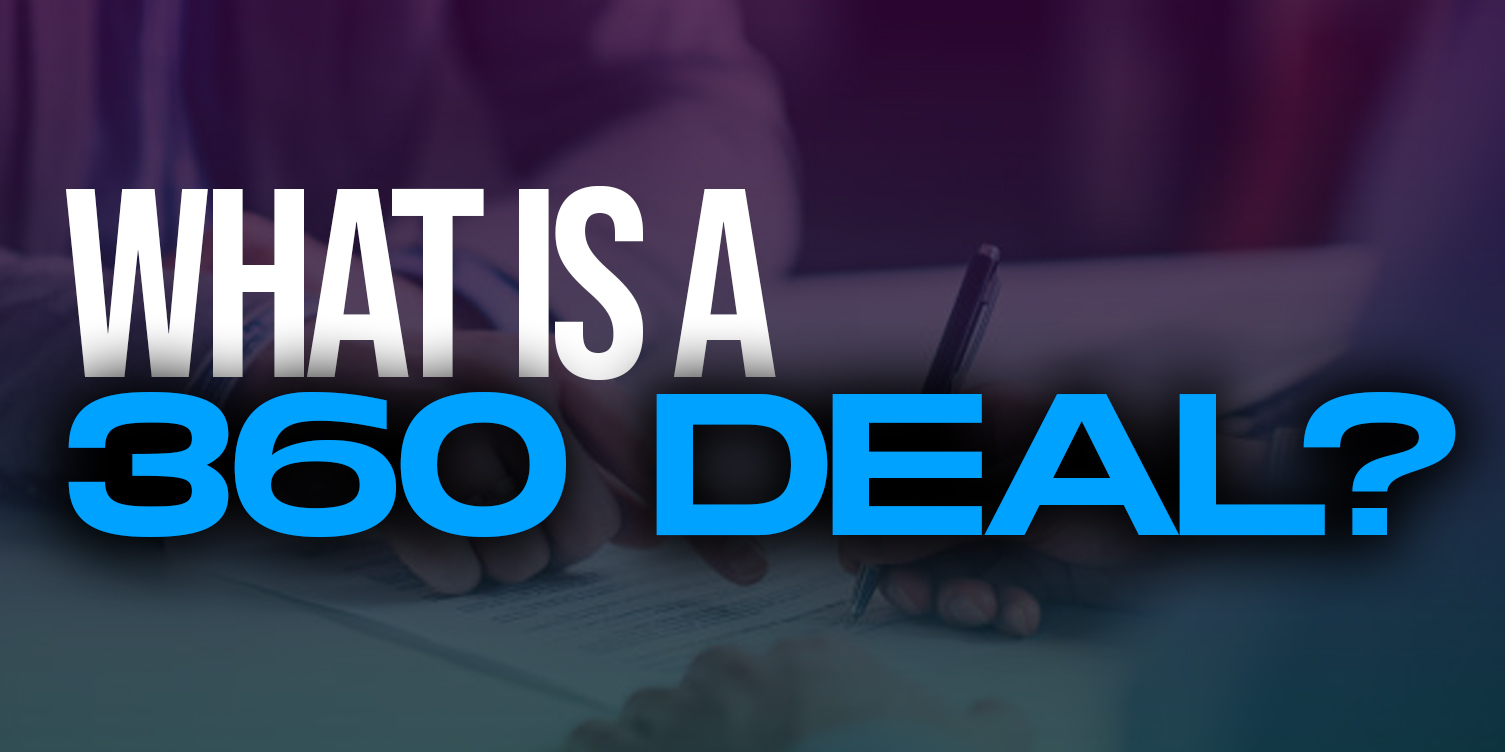
When an artist signs a 360 Deal, the record label receives a cut of the money they make from every source of income, not just from the sale of their albums.
The 5 Types of Record Deals Artists Should Sign
These earnings may come from a variety of sources, such as book and movie deals, endorsement deals, ringtone sales, live concert ticket sales, merchandise sales, and publishing royalties.
It's up to the artist to agree to this deal, depending on certain factors.
If you're looking for completely free music distribution, without the worry of contracts, lawyers, or hidden fees, we encourage you to check out Boost Collective!
Want to get your music on active & relevant playlists that actually get results?
Get your music heard now 👇
What Are 360 Deals?
If you want your recorded music to be played on the radio, go on tours around the world, and have a marketing budget in the millions, a 360 deal with a major record label could be the answer.
Independent musicians may not have a lot of money to put toward promotional and touring costs at the outset, but record labels are like bottomless pits.
Signed artists will have access to unrivaled industry connections and direct relationships with distributors. However, there is a price to pay for everything.
In a 360 deal, the record label is entitled to be reimbursed for all of the money it spends on the promotion and development of an artist's career.
Artists must still pay back their advances, but they can finally give up their lattes and focus on their music full-time.
Music Distribution For Record Labels
The 360 record deal mastermind – Lyor Cohen
Warner Music Group CEO Lyor Cohen spoke at this year's Rethink Music conference, but he wasn't there to discuss the company's upcoming auction.
Instead, he emphasized the importance of nurturing artists and a genuine passion for the music industry & artist's success.
In reality, attendees were advised to keep quiet about the $3 billion-plus price tag attached to the Goldman Sachs-led auction for Warner.
Cohen, at the two-day conference devoted to exploring new and innovative ways into the future, defended the record label's traditional role in developing and launching artists with zeal, as well as the 360 partnerships Warner has struck with many stars on its roster to share in all earnings.
Cohen stated that retaining a smaller roster of artists and releasing fewer records is not enough to ensure success without combining intensive attention to talent development with 360 deals.
Cohen added that the corporation is highly open to innovative approaches to the digital future, even in the face of complications like Spotify.
According to him, the CD party's inflated profits are to blame for the industry's current collapse, and the sector has really risen at a typical rate if you discount that outlier.
He said that record companies should focus on what they do best: nurturing new talent and releasing albums with lasting cultural impact.
That should lead to reduced sibling rivalry and other forms of interpersonal strife. He longs for the "never bogarted information" days of the record industry.
He wished for a return to the days when people "held each other's hands" and "loved watching other people win."
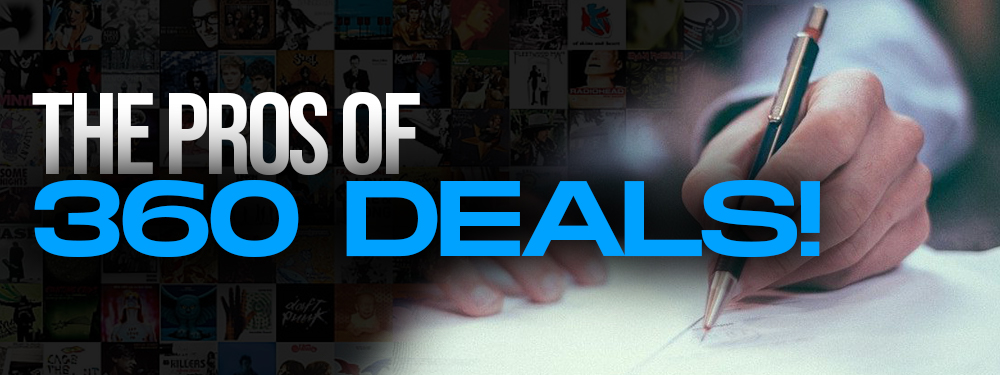
What Are the Pros Of 360 Deals?
There are many pros if an independent artist wants to pursue a 360 deal.
The best pro (in our opinion), is that the label takes care of a lot.
Here are some examples:
-
music publishing
-
album sales
-
record sales
-
creating your own merch
-
financial support
"But I can do all of that on my own, and make more record sales!"
True, but also not true.
The music company/record label you're signed to is supposed to set you up for success as an artist.
They have connections, revenue streams, music publishing, and sign artists all the time!
They're a marketing powerhouse, essentially!
If they have your best interest in mind, and you secure a good deal, you're recorded music sitting on your laptop will turn into reputable hits!
Now, there are some downsides to these deals if you're not careful.
How To Make Music Online In 2024!
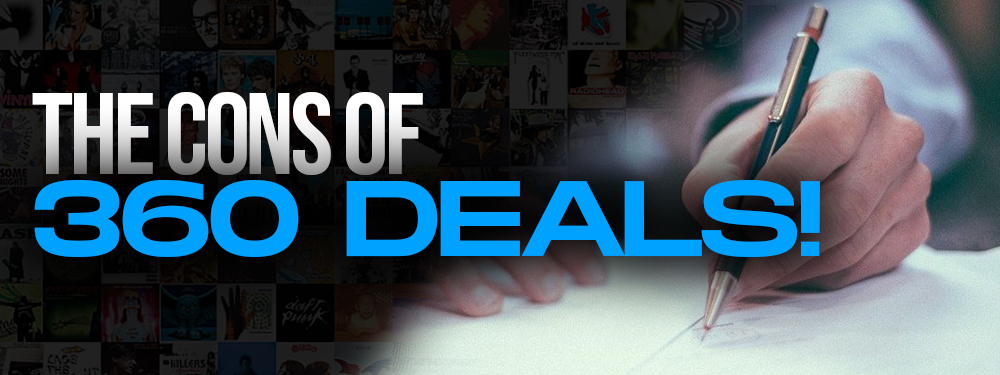
Cons Of A 360 Deal
Getting into major contract dealings and negotiations calls for a seasoned attorney.
They can act as your interpreter and guide you through these types of negotiations.
An experienced attorney can help an artist get the best possible deal out of a contract, especially in cases where the artist is already profitable.
The fact that you need to spend money on a lawyer in the first place is a major drawback.
Having the financial resources to hire a lawyer is typically a sign of success in the arts industry.
This indeed seems like a huge drawback, but it's preferable to signing without doing any due diligence and then crossing one's fingers and praying for the best.
How To Submit Your Music To Universal Music Group
What Role Do Record Labels Play?
Record labels claim that they invest heavily in an artist's career by, among other things, paying huge sums for recording (including advances to A-list producers), promoting the artist's music on commercial radio, getting the artist invited to perform on popular TV shows, and funding one or more high-quality music videos for digital distribution on sites such as YouTube and others.
For up-and-coming musicians, signing with a major label might be their ticket to stardom and financial success.
Or not, depending on your view!
For instance, Interscope spent a fortune putting Lady Gaga on tour as an opening act for the New Kids on the Block, paying for marketing, hiring wardrobe and beauty products, and paying all her other expenditures for over a year, and using their influence to get her invited as a guest on almost every popular radio station in the US.
That's not bad, ay?
Submit Your Music To 10k Projects Record Label
You Can Save Some of Your Record Sales
When signing an artist to a 360 record deal, a label is able to devote far more resources to the creation and promotion of the artist's work than in the case of a standard record agreement.
Instead of having certain artists languish on the shelf because their music isn't selling, a company will always have the opportunity to improve their roster with 360 record deals.
Everything in the game comes down to the individual artist and their vision for their career.
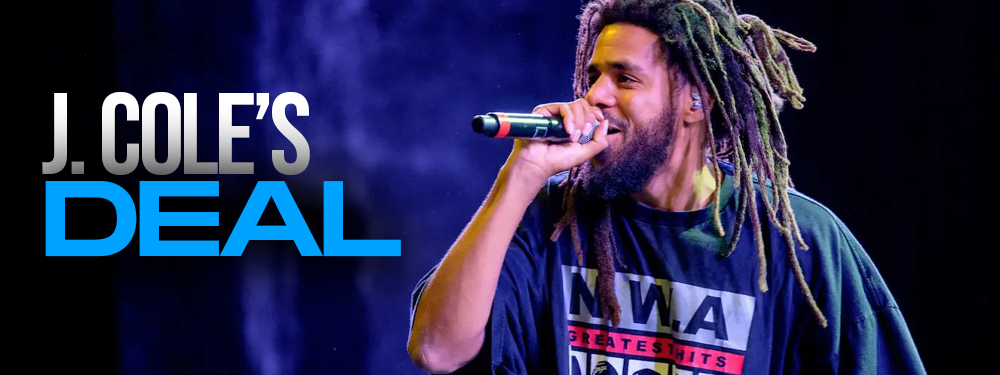
J. Cole’s 360 deal with Roc Nation
J. Cole has a 360 agreement with Jay-Roc Z's Nation, so he should be able to explain it to the other rappers who are still scratching their heads over it.
“Basically, 360 deals mean the label gets a piece of everything. Back in the days, it was sacred that a label could not touch your show money,” Cole said in an interview. “Worst things worst, if a label wasn’t putting you out, you could always eat off your show money, your merchandising, anything that your name is on, they couldn’t touch. But now that albums aren’t selling, labels need a way to make money, cause they’re losing money.”
Accordingly, the standard deal between an artist and a record label would entail the label paying for the recording, marketing, and distribution of the album, as well as receiving a percentage of the proceeds from any sales.
With the rise of illegal downloading, streaming services, and free music websites, record companies can no longer survive on music sales alone.
As a result, record labels have begun engaging in what is known as a "360 contract," in which they play an active role in all elements of an artist's career and reap financial benefits from every avenue of success.
This may seem like a horrible arrangement for the artist at first glance, but we'll let Cole elaborate.
“On the other hand, you want that because if I’m an artist on Def Jam, and my album didn’t sell that well, back in the day a label was so quick to shelf you. So quick to be like, F--- you, we can’t make any money off you no more, your album cost too much, blah blah. But now if he had a 360 deal, the label will say, Aight let’s at least throw him on tour, let’s at least make money off them like that. And now you’re eating and the labels eating. And everyone’s happy.”
Access To The Best People In The Music Industry
360 deals allow an individual to network with professional labels, get their music out there on a massive scale, and potentially blow up.
Now, there are potential downsides we have mentioned, so it's not all sunshine and rainbows.
But, having access to industry professionals opens up a lot of doors for young & smaller artists.
This could be your first door into the music industry.
How To Submit Music To Cactus Jack!
Can 360 Deals be Negotiated?
A lawyer should endeavor to secure advances for each potential source of income if the record company is unable to do so.
It would be excellent if the attorney could additionally arrange for the label's right to commission each income stream to expire as soon as the record label recoups each payment for that stream.
If an artist receives a $100,000 endorsement agreement and the label has advanced $25,000 against a 25% commission for branding and endorsements, the artist would pay the label $25,000 (25% of $100,000) and the label would have no further claim to any further payments from the endorsement arrangement.
But again, that's giving up a lot of money!
How Artificial Intelligence Is Changing The Industry!
You Might Give Up Your Creative Control To The Record Label
Being chained to a label's involvement in everything you do can be extremely overwhelming and restricting at times.
It depends on what record labels you're signed to, but for the most part, artists give up some potential creative control.
You'll have to weigh the risks, are you willing to give up some of your authenticity in order to make more money?
Questions like these aren't easy to answer, and require lots of reflection!
Does Distrokid Distribute Music Videos?
Do I Really Need a 360 Deal?
A lot of times artists believe that they need a 360 deal for their music career.
For most artists, you really don't need one.
Now, in the digital age, we have access to so many tools we used to not have access to.
-
cheap music production
-
free music distribution
-
information on literally everything
You don't need a fancy label to create a lucrative career for yourself.
You can create multiple income streams, distribute multiple albums, and make your own money without much expense!
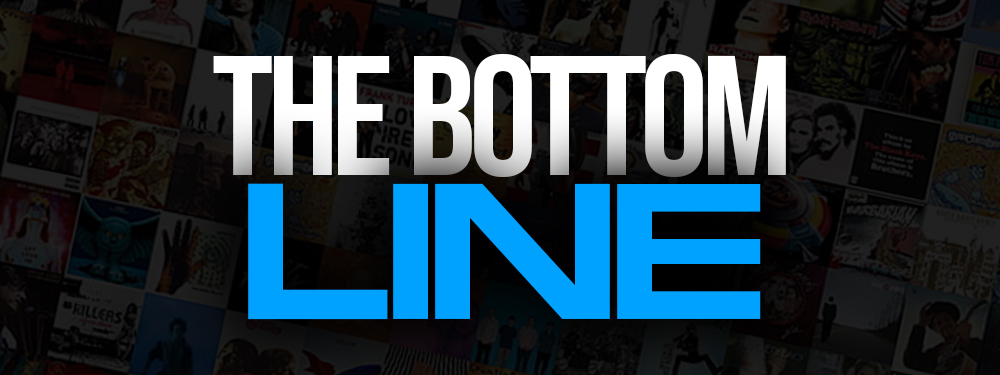
Conclusion
A new artist may have trouble convincing their record labels/music publisher to offer a 360 record deal after hearing horror stories about musicians losing millions due to low sales.
If you're curious about its value, think about the following characteristics that an individual like you should be mindful of:
This type of agreement is not for the new artist or an up-and-coming artist testing the waters.
You must accept the fact that a sizeable portion of the funds will never reach your bank account.
The urge to always be on the cutting edge of what's new is an unavoidable byproduct of modern life.
This could add stress to the lives of up-and-coming musicians whose careers hinge on the reception they receive for their debut albums.
A 360 deal isn't permanent, and if it's structured properly, the artist can walk away with more money than the label did without paying a thing.
It's a risk, but if the proper people hear the music, the payback may be huge for the musician and the record company.
Get your music on playlists now.
It’s time you get your exposure and listeners up - playlisting by Boost Collective has been trusted by 50,000+ artists worldwide.
It’s easy: Search your song, get on playlists, and track your campaign.
What’re you waiting for? Tap in - and get added to playlists in 24 hours.
Join Boost Collective for free here.
